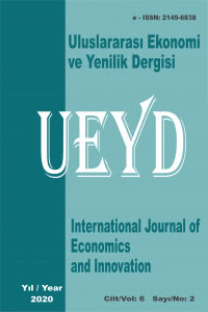Türkiye’nin Doğal Gaz Ticaret Merkezi Olma Sürecinin Değerlendirmesi
Türkiye; doğal gaz rezervleriyle tüketim bölgeleri arasında doğal bir köprü olma özelliği sebebiyle başarılı bir doğal gaz ticaret merkezi kurulabilmek adına büyük bir potansiyele sahiptir. Bugüne kadar Türkiye’de doğal gaz ticaretinin geliştirilmesi ve doğal gaz ticaret merkezi oluşturulması konusunda çeşitli adımlar atılmış olsa da, Türkiye bu konuda hala uzun bir yola sahiptir. Bu kapsamda, “Türkiye bir doğal gaz ticaret merkezini nasıl kurar ve bir doğal gaz ticaret merkezi kurmak için gereklilikler nelerdir?” soruları gündeme gelmektedir. Bu açıdan, bu çalışmada Türkiye doğal gaz piyasasının mevcut yapısı, gelişmiş Avrupa piyasaları ile de karşılaştırılarak analiz edilmiş ve Türkiye’nin başarılı bir doğal gaz ticaret merkezi oluşturabilmesi için gerekli piyasa yapısı hususunda çeşitli politika önerileri sunulmuştur. Bu çalışmada elde edilen en önemli sonuç Türkiye’nin uzun dönemli doğal gaz alım kontratlarının sona ermesi öncesinde stratejik bir yol haritası çizmesi gerekliliği olduğudur.
An Evaluation of Turkey’s Natural Gas Hub Development Process
Since Turkey is a natural bridge located between the gas reserves and consumption regions, it has a big potential to create a successful natural gas hub. Although initial steps have been taken to path the way to facilitate the gas trade and create a gas hub in Turkey, there is still a long way. In this study, we derived requirements from the literature to create a working gas hub, analyzed the Turkish natural gas market’s current structure in light of the derived requirements by benchmarking with developed European gas hubs, and made several policy suggestions to form a new market structure for the sake of creation of a successful gas hub. The most important result that we have obtained via this study is that Turkey is on a critical path before the expiration of long-term supply contracts and should draw a strategic path as soon as possible.
___
- Akcollu, F.Y. (2006). Major Challenges to the liberalization of the Turkish Natural Gas Market. OIES: NG-16.
- Austvik, O. G., Rzayeva, G. (2017). Turkey in the geopolitics of energy. Energy Policy, 107, 539-47.
- Bianco, V., Scarpa, F., Tagliafico, L. A. (2015). Current situation and future perspectives of European natural gas sector. Front Energy, 9, 1-6.
- Biresselioglu, M.E., Kaplan, M.D., Ozyorulmaz. (2019). Towards a liberalized Turkish natural gas market: a SWOT analysis. Energy Sources, Part B: Economics, Planning, and Policy, 2 (2015), 25-33.
- Blaket, S., Srinivasan, S., Laurent, R., Grainge, Z., Ritter, F.(2018). The Swing in Dutch gas: From autonomy to full dependence. Ihs Markit Strategic Report, 10-26.
- BOTAŞ.(2020).Almanak.https://www.botas.gov.tr/uploads/sayfaResim/745066- almanak-son-26-subat-1-baski.pdf. (Access 15.05.2020).
- Cetin, T., Oguz, F. (2007). The reform in the Turkish natural gas market: A critical evaluation. Energy Policy, 35, 3856–67.
- EMRA. (2018). Market Rules and Procedures.
- EMRA. (2019). BOTAS Network Code on Gas Transmission System.
- Erdogdu, E. (2007). Regulatory reform in Turkish energy industry: An analysis. Energy Policy, 2, 984-993.
- EXIST. (2019). Transparency Platform. https://seffaflik.epias.com.tr/transparency/ (Access: 01.02.2019).
- European Commission. (2014). Commission Regulation (EU) No 312/2014 of 26 March 2014 establishing a Network Code on Gas Balancing of Transmission Networks. Off J Eur Union 2014, 15–35.
- Grandi, L. (2014). European gas markets: From oil indexation prices to spot prices?. Energy Brains.
- Hulshof, D., van der Maat, J.,P., Mulder M. (2015). Market fundamentals, competition and natural-gas prices. Energy Policy, 94, 80–91.
- Heather, P. (2010). The Evolution and Functioning of the Traded Gas Market in Britain. OIES. Heather, P. (2015) The evolution of European traded gas hubs. OIES.
- IEA. (2013). Developing a Natural Gas Trading Hub in Asia: Obstacles and Opportunities, 1-83.
- Miriello, C., Polo, M. (20 15). The development of gas hubs in Europe. Energy Policy, 84,177–90.
- Polo, M., Scarpa, C. (2012). International Journal of Industrial Organization Liberalizing the gas industry: Take-or-pay contracts, retail competition and wholesale trade. Int J Ind Organ, 31, 64–82.
- Rzayeva, G. (2014) Natural Gas in the Turkish Domestic Energy Market. OIES.
- Rzayeva, G. Gas Supply Changes in Turkey. (2018). OIES.
- Tagliapietra, S. (2014) Turkey as a Regional Natural Gas Hub: Myth or Reality? An Analysis of the Regional Gas Market Outlook, Beyond the Mainstream Rhetoric. Turkish Policy Q.
- Umucu, T., Altunisik, M., Kok, M. V., Umucu, T, Altunisik M, Kok, M., V. (2012). Turkey as a Major Gas Transit Hub Country Turkey as a Major Gas Transit Hub Country. Energy Sources, Part A.
- Xiaoguang, T., Jiong, Z., Bo, F. (2015). Strategic analysis on establishing a natural gas trading hub in China. Nat Gas Ind B, 1,210–20.
- Xunpeng, S. (2016). Development of Europe’s gas hubs : Implications for East Asia. Nat Gas Ind B, 3, 357–66.
- Xunpeng, S., Variam, H.M.P. (2018). Key elements for functioning gas hubs : A case study of East Asia. Nat Gas Ind B, 5, 167–76.
- ISSN: 2149-6838
- Yayın Aralığı: Yılda 2 Sayı
- Başlangıç: 2015
- Yayıncı: Seyfettin Artan
Sayıdaki Diğer Makaleler
Türkiye’nin Doğal Gaz Ticaret Merkezi Olma Sürecinin Değerlendirmesi
Savunma Sanayi Ar-Ge Merkezlerinin Performanslarının Entropive Aras Yöntemleri İle Değerlendirilmesi
Kamerun ve Türkiye’de Kadınların Sosyal Yaşama Katılım Gelişiminin Karşılaştırmalı Analizi
Kurumsal İtibar ile Finansal Performans Arasındaki İlişkide İnovasyon Kapasitesinin Aracılık Etkisi
Covid-19, Yatırımcı Duyarlılığı ve Pay Piyasaları Arasında Bulaşma Etkisi
OECD Ülkelerinde Vergi Takozu ve İşsizlik İlişkisi
Türkiye'nin Doğal Gaz Ticaret Merkezi Oluşturma Sürecinin Değerlendirmesi
An Evaluation of Turkey’s Natural Gas Hub Development Process
